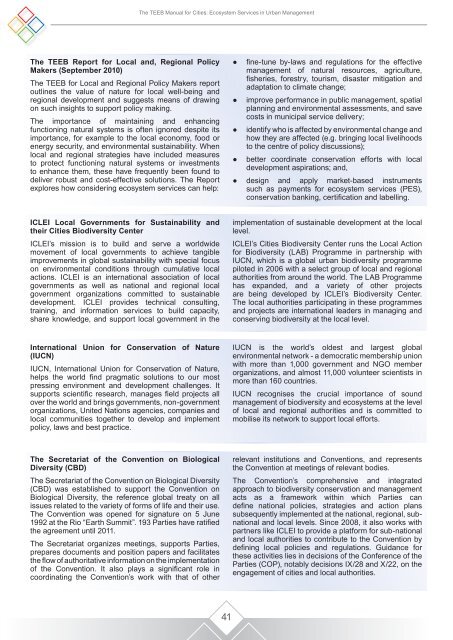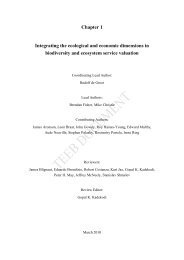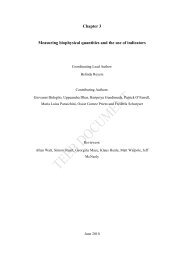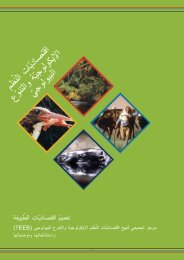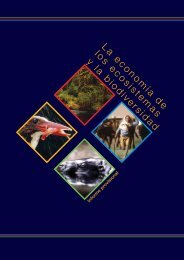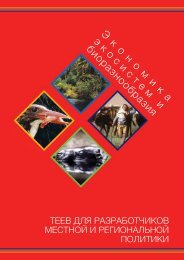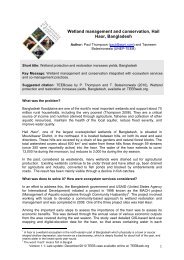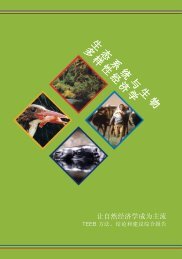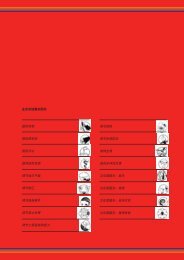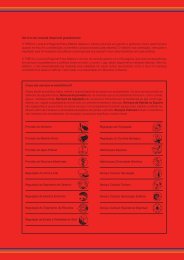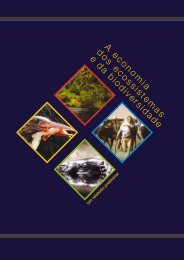TEEB Manual for Cities
TEEB Manual for Cities
TEEB Manual for Cities
You also want an ePaper? Increase the reach of your titles
YUMPU automatically turns print PDFs into web optimized ePapers that Google loves.
The <strong>TEEB</strong> <strong>Manual</strong> <strong>for</strong> <strong>Cities</strong>: Ecosystem Services in Urban ManagementThe <strong>TEEB</strong> Report <strong>for</strong> Local and, Regional PolicyMakers (September 2010)The <strong>TEEB</strong> <strong>for</strong> Local and Regional Policy Makers reportoutlines the value of nature <strong>for</strong> local well-being andregional development and suggests means of drawingon such insights to support policy making.The importance of maintaining and enhancingfunctioning natural systems is often ignored despite itsimportance, <strong>for</strong> example to the local economy, food orenergy security, and environmental sustainability. Whenlocal and regional strategies have included measuresto protect functioning natural systems or investmentsto enhance them, these have frequently been found todeliver robust and cost-effective solutions. The Reportexplores how considering ecosystem services can help:●●●●fine-tune by-laws and regulations <strong>for</strong> the effectivemanagement of natural resources, agriculture,fisheries, <strong>for</strong>estry, tourism, disaster mitigation andadaptation to climate change;improve per<strong>for</strong>mance in public management, spatialplanning and environmental assessments, and savecosts in municipal service delivery;identify who is affected by environmental change andhow they are affected (e.g. bringing local livelihoodsto the centre of policy discussions);better coordinate conservation ef<strong>for</strong>ts with localdevelopment aspirations; and,● design and apply market-based instrumentssuch as payments <strong>for</strong> ecosystem services (PES),conservation banking, certification and labelling.ICLEI Local Governments <strong>for</strong> Sustainability andtheir <strong>Cities</strong> Biodiversity CenterICLEI’s mission is to build and serve a worldwidemovement of local governments to achieve tangibleimprovements in global sustainability with special focuson environmental conditions through cumulative localactions. ICLEI is an international association of localgovernments as well as national and regional localgovernment organizations committed to sustainabledevelopment. ICLEI provides technical consulting,training, and in<strong>for</strong>mation services to build capacity,share knowledge, and support local government in theimplementation of sustainable development at the locallevel.ICLEI’s <strong>Cities</strong> Biodiversity Center runs the Local Action<strong>for</strong> Biodiversity (LAB) Programme in partnership withIUCN, which is a global urban biodiversity programmepiloted in 2006 with a select group of local and regionalauthorities from around the world. The LAB Programmehas expanded, and a variety of other projectsare being developed by ICLEI’s Biodiversity Center.The local authorities participating in these programmesand projects are international leaders in managing andconserving biodiversity at the local level.International Union <strong>for</strong> Conservation of Nature(IUCN)IUCN, International Union <strong>for</strong> Conservation of Nature,helps the world find pragmatic solutions to our mostpressing environment and development challenges. Itsupports scientific research, manages field projects allover the world and brings governments, non-governmentorganizations, United Nations agencies, companies andlocal communities together to develop and implementpolicy, laws and best practice.IUCN is the world’s oldest and largest globalenvironmental network - a democratic membership unionwith more than 1,000 government and NGO memberorganizations, and almost 11,000 volunteer scientists inmore than 160 countries.IUCN recognises the crucial importance of soundmanagement of biodiversity and ecosystems at the levelof local and regional authorities and is committed tomobilise its network to support local ef<strong>for</strong>ts.The Secretariat of the Convention on BiologicalDiversity (CBD)The Secretariat of the Convention on Biological Diversity(CBD) was established to support the Convention onBiological Diversity, the reference global treaty on allissues related to the variety of <strong>for</strong>ms of life and their use.The Convention was opened <strong>for</strong> signature on 5 June1992 at the Rio “Earth Summit”. 193 Parties have ratifiedthe agreement until 2011.The Secretariat organizes meetings, supports Parties,prepares documents and position papers and facilitatesthe flow of authoritative in<strong>for</strong>mation on the implementationof the Convention. It also plays a significant role incoordinating the Convention’s work with that of otherrelevant institutions and Conventions, and representsthe Convention at meetings of relevant bodies.The Convention’s comprehensive and integratedapproach to biodiversity conservation and managementacts as a framework within which Parties candefine national policies, strategies and action planssubsequently implemented at the national, regional, subnationaland local levels. Since 2008, it also works withpartners like ICLEI to provide a plat<strong>for</strong>m <strong>for</strong> sub-nationaland local authorities to contribute to the Convention bydefining local policies and regulations. Guidance <strong>for</strong>these activities lies in decisions of the Conference of theParties (COP), notably decisions IX/28 and X/22, on theengagement of cities and local authorities.41


